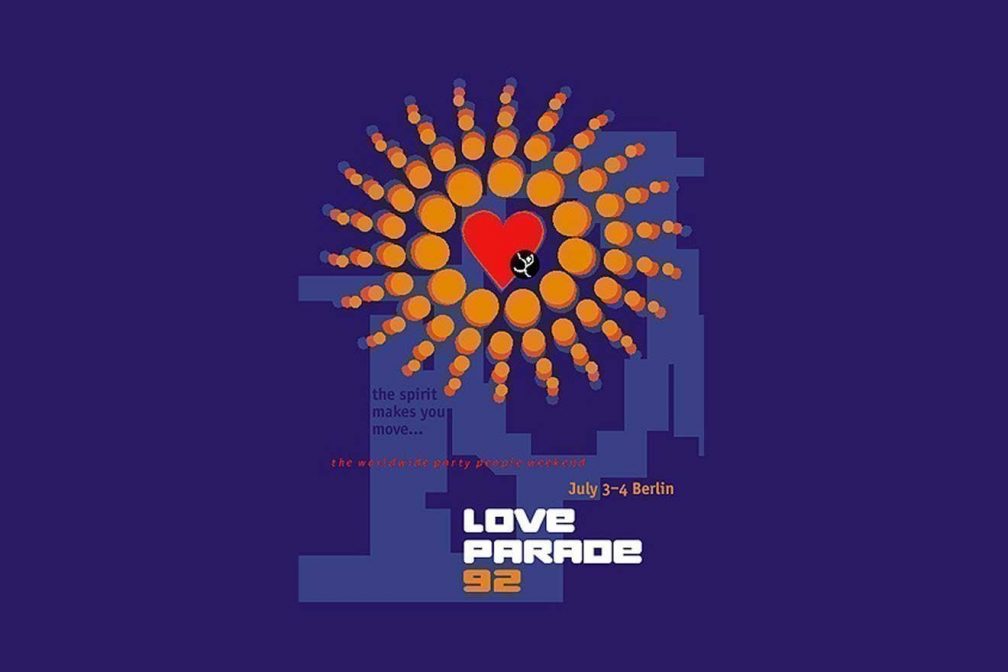 Features
Features
Love Parade '92: The sound of the family
Matthew Collin recalls the Berlin Love Parade of 1992 and reveals how it was inspired by the UK’s Summer of Love
The first ever Love Parade in 1989 saw around 150 ravers trip gaily down the Kurfürstendamm, waving their arms in the air in the acid house style of the time, some dressed in smiley T-shirts and bandanas, others in 80s casualwear or the monochrome shades of the post-punk era. "We started from Wittenbergplatz, we were standing there with our three little vans and loudspeakers and generators. And tape decks! We were using tape decks!" Motte recalled. "There was a fine rain, like British weather, raining but not exactly raining. We stood there and didn't know when to start. Then the police came and asked us: 'Do you want to start now?'" He laughed at the absurdity: officers of the law asking the techno insurgents when they wanted to start their shambolic little uprising. "We had no clue! Nobody had done it before."
Among the dancers that day was the nucleus of what would become the Berlin techno scene. "It was like a shiver down the back, an energy I had never felt before," Motte said. Westbam insists that there was, even then, a sense that this would become something important: "Even though it was just this handful of people, in a crazy way we felt that we were writing history. But would anybody on that day have said that in a few years there would be a million people? I don't think so. If you had told me the Wall would come down a few months later? No, no!"
This enthusiasm was still simmering when I talked to Tanith at the Love Parade in 1992. "The clubs were the first place East and West came together and people recognised they were not different," he told me, his voice full of optimism about the possibilities that had opened up.
A lot of the early participants still believe this was true: one of the Love Parade organisers, Jürgen Laarmann, insisted years later that he was convinced that techno played a significant role as a unifying force in post-Wall Berlin: "On the dancefloor, under the stroboscopes and lasers, that was the first place where reunification really worked, and where people were really equal," he said.
The Love Parade grew exponentially each year, and by 1996 it had to move away from the Kurfürstendamm because it had become too big to be constrained by the tight confines of the city-centre thoroughfare. But though this marked a clear break
with its subcultural past as an annual
reclaiming of an urban consumer space, its new venue was laden with a different but equally powerful significance: the Strasse des 17. Juni, the street that Adolf Hitler had used for his Nazi parades; the same street which had been renamed after the failed uprising against the East German communist regime in 1953. But now it was the scene for a colossal rave. For the new, united Germany, the symbolism could not have been clearer: "It was a kind of reinvention of post-war Germany after the Wall came down," said Westbam. "It painted a completely different picture."
In terms of numbers, the parade peaked at the turn of the millennium, becoming a populist dayglo rave extravaganza as it drifted away from its subcultural roots in the shadow of the old Wall. It even sparked an annual techno counter-demonstration each year called the Fuck Parade, which was set up to protest against its lurid commercialisation.
Eventually, in a development that many considered the ultimate sell-out, the Love Parade name was bought by a fitness club chain, and in 2007, it moved out of Berlin to the Ruhr Valley. There it would m eet its end in a brutal, avoidable tragedy that left 21 people dead in a horrific stampede in Dortmund in July 2010. The Love Parade was finished, but during its Berlin years it had helped to create a new image of the city as a hedonist wonderland and one of Europe's creative capitals.
It's a perception that endures to this day, one that was built on the high ideals and crazy dreams of a group of young adventurers living through a unique moment in history that can never be repeated. As Dr Motte recalled years afterwards, the unimaginable suddenly became possible: "Everything was improvised then – everything. It was paradise, full-on, we could do anything, and no-one cared."
Matthew Collin's new book Pop Grenade: From Public Enemy to Pussy Riot – Dispatches from Musical Frontlines is published by Zero Books on May 29


